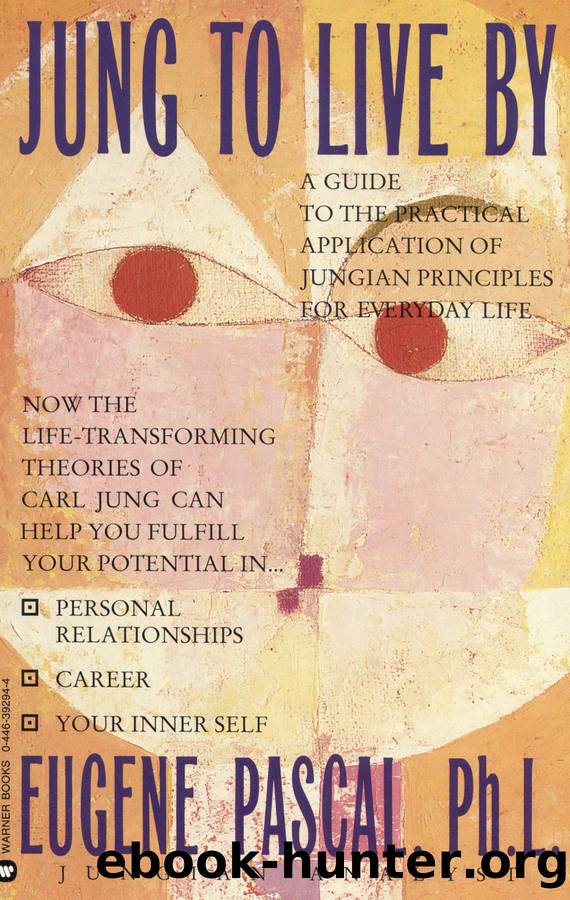Jung to Live by by Eugene Pascal

Author:Eugene Pascal [PASCAL, EUGENE]
Language: eng
Format: epub
Tags: Self-Help / General
Publisher: Grand Central Publishing
Published: 2009-11-29T00:00:00+00:00
The Shadow, Sin and Guilt
The shadow is the entity that we first encounter in our dream-work and our journey into the unconscious. No matter what its nature, it offers us an initial view of the repressed parts of our personalities. It has been said that, when transformed, the darkest shadow is eighty percent gold. The means for this alchemical transformation from lead to gold, as it were, will be discussed at length in chapter 12.
Jungâs psychology is ethical (stemming from the feeling function of typology), and in this it differs somewhat from other schools of therapy. Ethics is firmly based on the understanding that oneâs own happiness can never be had at the expense of someone elseâs. In fact happiness achieved at the expense of another is not genuine, nor can it be long-lived. Exploiting or taking advantage of others will merely turn them into enemies who will eventually want revenge or to set things aright by force, causing all sorts of mischief for us. Common sense dictates that the end does not justify the means.
Classically in our culture the negative shadow qualities were enumerated as the Seven Capital Sins, namely pride, envy, greed, lust, gluttony, anger and sloth. The antidote to these seven poisons was broken up into two pairs, one of seven and the other of nine. The group of seven, called Gifts of the Holy Spirit, are wisdom, understanding, prudence (supernatural common sense), fortitude, knowledge, piety and awe before the Absolute. The group of nine are called Fruits of the Holy Spirit, namely, charity, joy, peace, patience, kindness, goodness, faith, mildness and temperance. If we understand the Holy Spirit to mean the transcendent Self, then these healing states of consciousness, these Gifts and Fruits, are evoked by our strivings toward wholeness and by sensitizing our egos to the subtle movements of the transpersonal Self within, the very essence of wholeness, and they will generally keep us out of a lot of psychological trouble. They must be âprayed outâ of ourselves.
Before we feel better concerning our negative shadow sides, we must expect to feel worseâdownright depressed in fact. Surmounting the first barrier, withdrawing projections and focusing on the darkness within, is simply a depressing experience. Such a withdrawal is accompanied by a shattering of self-illusions and the feeling of having lived a false and hypocritical existence. In Jungâs experience, Roman Catholics fared better at this initial stage than Protestants since from the age of seven Catholics ritually confess their sins to a priest, including misdemeanors on the levels of thought, word and deed. Sharing oneâs dark side, in what is called the Sacrament of Reconciliation, with another sympathetic human being is in itself a healing activity, albeit a humbling one. It is a tool, and the healing depends on how and with what attitude one uses it. And, no matter what our outer achievements, it reminds us that we are all still only human. Clinically as well, by revealing pathogenic secrets (for example, incestual desire, murder, perverse activity) to the nonjudgmental therapist the patient makes an emotional breakthrough toward healing.
Download
This site does not store any files on its server. We only index and link to content provided by other sites. Please contact the content providers to delete copyright contents if any and email us, we'll remove relevant links or contents immediately.
The Art of Thinking Clearly by Rolf Dobelli(10467)
Mindhunter: Inside the FBI's Elite Serial Crime Unit by John E. Douglas & Mark Olshaker(9329)
Change Your Questions, Change Your Life by Marilee Adams(7769)
Nudge - Improving Decisions about Health, Wealth, and Happiness by Thaler Sunstein(7697)
Mastermind: How to Think Like Sherlock Holmes by Maria Konnikova(7330)
The Power of Now: A Guide to Spiritual Enlightenment by Eckhart Tolle(5765)
Men In Love by Nancy Friday(5237)
Altered Sensations by David Pantalony(5095)
Factfulness: Ten Reasons We're Wrong About the World – and Why Things Are Better Than You Think by Hans Rosling(4738)
The Confidence Code by Katty Kay(4252)
Thinking in Bets by Annie Duke(4220)
Man and His Symbols by Carl Gustav Jung(4132)
The Worm at the Core by Sheldon Solomon(3486)
Why Buddhism is True by Robert Wright(3448)
Liar's Poker by Michael Lewis(3445)
Three Women by Lisa Taddeo(3428)
The Inner Life of Animals by Peter Wohlleben(3316)
Descartes' Error by Antonio Damasio(3274)
How Music Works by David Byrne(3263)
